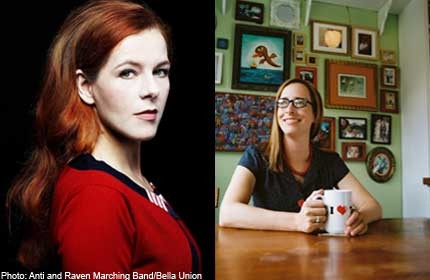Mummy rock

UNITED STATES - Listening to these records by two of America's most distinctive singers, you recall the words of speculative fictionist N.K. Jemisin: "In a child's eyes, a mother is a goddess. She can be glorious or terrible, benevolent or filled with wrath, but she commands love either way."
Motherhood is a tough topic to write about without getting mopey - so it's credit to indie tough cookie Neko Case and troubadour Laura Veirs that they don't sugarcoat it at all.
Case wrestles with it head-on in Nearly Midnight, Honolulu, the standout track of her sixth album. She had witnessed a mother-daughter exchange while waiting for a bus in Hawaii. It was so harrowing, she sang it without music.
"Get the f*** away from me! Why don't you ever shut up!" she dishes the killer line from the mother's standpoint.
By the end, she addresses the child: "Some days you'll feel like a cartoon… please, kid, have your say/Cause I'll still love you/Even if I don't see you again."
The track sums up the singer's inner turmoil. In the last few years, she fell into deep depression as her family members died: First, the death of her grandmother, followed by the deaths of her own parents, whom she was estranged from.
The results are The Worse Things Get, The Harder I Fight, The Harder I Fight, The More I Love You, an unremitting rack of confessionals that drags wounds over embers.
In the opening track, Wild Creatures, she proffers an ambivalent line: "When you catch the light/You look like your mother/It crushes me some/Just right from the side."
The music, initially an easy swing of limber guitars and drums, erupts into a tempest.
Throughout, she doesn't apologise. In the most defiantly electric track Man, she flips the middle finger and spits out: "I'm a man/That's what you raised me to be/ I'm not an identity crisis."
She's devastating even when she lets down her guard, as in the intriguingly textured Where Did I Leave That Fire?.
"I wanted so badly not to be me," she delivers coolly, a submarine sonar giving way to a spectral piano and rustling percussion.
Case incidentally also appears on the opening track Sun Song, lending sisterly harmony to Veirs' latest album Warp And Weft. "Stalked by winter/Solace in a small warm hand," Veirs sings softly over a delicate folk and indie fuzz, zeroing in on "the spectre of darkness" that haunts every parent.
Written when she was pregnant with her second child, she was afflicted with parental fears about mortality and the kind of world she's raising her kids in.
In Dorothy Of The Island, about a mother who plunges to her death, she cribs the refrain from a blues traditional: "Motherless children have a hard time."
You hear, too, her maternal anxiety in Sadako Folding Cranes, an elegy for the Japanese kid who was irradiated in Hiroshima in 1945.
The gentle mandolin strums are counterpointed by synth and cymbal stirring, and a coda of wordless chorus.
Veirs' music is sonic origami, so exquisite yet terribly fragile, you'd fold and unfold and discover its timorous heart.

Get a copy of The Straits Times or go to straitstimes.com for more stories.